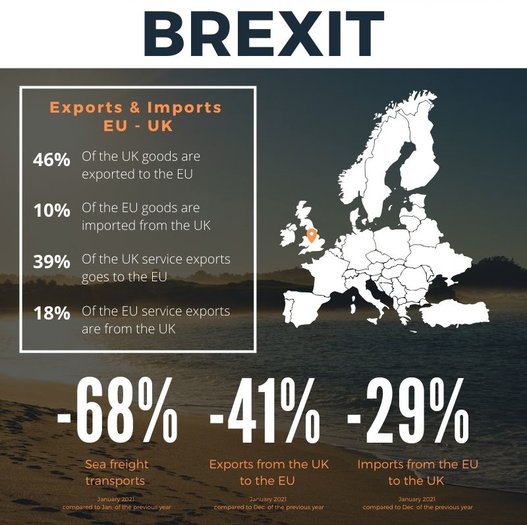As expected, the consequences of Brexit were not long in coming. Already during the 2016 referendum, the number of shipments fell markedly, peaking in January 2021, when exports to the UK fell by 30% compared to the same period last year. Even large companies such as DB Schenker and DPD suspended shipping for some time. But does the Brexit have these serious consequences in terms of trade and logistics?
Find ideal partners for your transport to or from Great Britain with our Major Customer Platform!
Content Overview
- What Difficulties Does Brexit Bring?
- Are There any Solutions? How can Brexit be Made Easier for Logisticians?
- Individual Help
- Links to simplify UK customs clearance
What Difficulties Does Brexit Bring?
The biggest obstacle is probably the customs bureaucracy and trade barriers. This has already led to bizarre scenes in which trucks were sent back for false papers. The food industry also has its issues with waiting times. The shipment of perishable goods such as e.g. seafood, suffers from the new regulations for customs and food safety regulations. But it’s not only the long waiting times at ports and the Eurotunnel, which have already risen rapidly through Covid-19, that have become a problem. More and more forwarding and logistics companies are complaining about faulty or even incompletely documented shipments. The UK's exit from the customs union, and thus the free movement of goods, has created a major mess that results not only in a high time consumption.
The additional burden of the extra bureaucracy poses a problem not only for logisticians, but also for their customs agents on both sides. Seemingly every day, new regulations come along, which you have to keep track of.
Are There any Solutions? How can Brexit be Made Easier for Logisticians?
In order to facilitate the movement of goods to the UK and to counteract the decline in shipments, the United Kingdom has decided to suspend full import control until January 2022 and to simplify registration for this time. Whether this minimises waiting times in the future as they hoped remains to be seen. However, it gives companies time to adapt to the new customs regulations and adapt the processes.
However, the logistics industry must now also act on its own and engage with the new situations and regulations. Here are a few tips on how to deal with Brexit:
- Information, information, information: The research is time-consuming, but definitely essential in transporting and trading with Great Britain. Staying up to date is always important, but especially when it comes to customs formalities and news from the trade in goods. This is the only way to avoid additional costs and keep supply chains running. Reliable bodies for documents are the competent customs authorities. (Further below you will find useful links for customs clearance UK.) Also keep in close contact with your UK partners for information on regulations and goods.
- Get creative: Trucks are often loaded with many different goods. This can cause some problems with the customs bureaucracy and lead to a long waiting period at the border, as each good has to be checked individually. So, what if you loaded the truck or container exclusively with one type of goods – if, e.g. the container is only filled with pallets of clothes? Here, of course, it should be calculated individually beforehand whether the additional kilometres pay off in relation to the waiting time.
- Finding alternatives: If trade with the UK is no longer profitable, as the financial burden of rising personnel costs, customs duties and waiting times becomes too high, other solutions must be found. One option here would be to consider alternative routes. For example, strengthen intra-European business relationships that will secure your business, if the problem at the UK's borders persists for a while.
Individual Help
We ask for your understanding that we cannot give you a Step by Step Guide on how to deal with Brexit. Depending on the goods, route and means of transport, there are a large number of individual possibilities with which only your current logistics partner can help you.
Use our logistics search engine so that we can respond to your needs individually and find transport prices and new logistics partners.
Links to simplify UK customs clearance
- The Brexit bot is a chatbot for brexit issues:
- UK customs information on Brexit:
- Information from the German customs authority on imports from non-EU countries:
